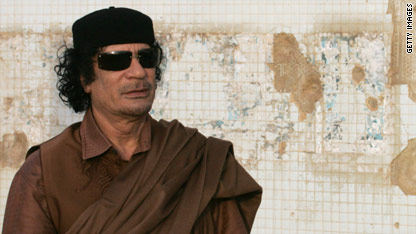
Tripoli, Libya (CNN) -- Libyans erupted in euphoria Thursday after longtime Libyan dictator Moammar Gadhafi was killed by revolutionary forces who were finally able to overrun his hometown of Sirte.
After weeks of fighting, troops from the country's transitional government attacked a house in Sirte where the deposed leader was hiding and shot him while he tried to flee, Information Minister Mahmoud Shammam told CNN. The streets of Tripoli echoed with celebratory gunfire, car horns and cheers as crowds ran or danced through the streets.
"This is a time to start a new Libya, with a new economy, with a new education and with a new health system -- with one future," Mahmoud Jibril, Libya's transitional prime minister, said after proclaiming Gadhafi's death.
Grainy video broadcast on Arabic satellite networks showed a blood-smeared but still-living Gadhafi, dressed in what appear to be military fatigues, being hauled onto a truck after his capture. Another video showed an apparently dead Gadhafi with what appears to be a head wound, but it was not clear what happened after his capture.
Gadhafi's body was taken to Misrata, said Mahmoud Al Nacoua, the Libyan ambassador to Britain.
"A black era has come to an end forever," the ambassador told reporters in London.
Gadhafi's killing caps an eight-month revolt and comes two months after rebels from the National Transitional Council overran his Tripoli compound and drove him from power. The mercurial former army officer, who seized power in a 1969 coup and had himself declared "king of kings" of Africa in 2008, was the third Arab leader ousted in the "Arab Spring" upheavals that began in neighboring Tunisia in January.
Abubaker Saad, who was a Gadhafi aide for nine years, said it didn't really matter whether Gadhafi was dead or alive -- as long as he was no longer a fugitive.
"As long as he was on the run, he represented a very ominous danger to the Libyan people," Saad told CNN. "He represented a very ominous danger ... to the idea of the democracy in Libya."
Also killed Thursday were Gadhafi's son Mutassim and the chief of intelligence, Abdullah al-Senussi, said Anees al Sharif, a spokesman for the National Transitional Council's military arm in Tripoli.
Fawaz Gerges, a professor of Middle Eastern politics at the London School of Economics, told CNN that Libyans still face a difficult political struggle. But he added, "We should not underestimate the significance of this day."
"Gadhafi was the head of the state, the most important symbol of the country. He repeatedly tried to rally his supporters to fight on," Gerges told CNN. "I hope that this particular day will not just mean the end of an era, but basically represent the beginning of a new era."
Gerges said the recent fighting around Sirte and another holdout of pro-Gadhafi loyalists, Bani Walid, exposed "some major tribal and regional cleavages" that Libyans will have to bridge in forming a new government. Those differences "could easily escalate, given the extent and the intensity of differences in Libya."
But he said Gadhafi's death sends a signal to other strongmen in the region: "If you oppress your people, if you don't engage your civil society, if you stay in power for so many years, this will be your end."
The confirmation of his death came after hours of conflicting reports as to the deposed leader's status. When those reports first reached U.S. Secretary of State Hillary Clinton during a visit to Afghanistan, she reacted with one word: "Wow."
Clinton said the end of Gadhafi would "add legitimacy and relief to the formation of a new government." And in a brief address from the White House, President Barack Obama praised Libyans for lifting "the dark shadow of tyranny" with the aid of Western air power.
"One year ago, the notion of a free Libya seemed impossible," Obama said. "But then the Libyan people rose up and demanded their rights. And when Gadhafi and his forces started going city to city, town by town, to brutalize men, women, and children, the world refused to stand idly by."
The NATO allies, spearheaded by Britain and France, backed up the revolt by bombarding pro-Gadhafi forces under a U.N. mandate to protect civilians. In a statement from his office, French President Nicolas Sarkozy said Gadhafi's ouster marks the start of "a new era ... one of reconciliation in unity and freedom."
And British Prime Minister David Cameron said Thursday "is a day to remember all of Colonel Gadhafi's victims," including the 270 dead in the bombing of a Pan Am flight over Lockerbie, Scotland, in 1988 and "the many, many Libyans who died at the hands of this brutal dictator and his regime."
NATO said it will convene for a meeting to discuss ending its operation in Libya, a senior NATO official told CNN. Earlier, NATO aircraft struck two pro-Gadhafi military vehicles in the vicinity of Sirte.
"It will be very soon, perhaps next day or two," the official said.
Adm. James Stavridis, supreme allied commander of NATO, is looking at "key pieces of intelligence" to make that recommendation. That will include assessing whether the revolutionary fighters control Sirte, which NATO believes they do, and whether Gadhafi loyalists can mount any significant counterstrike.
Gadhafi, wanted by the International Criminal Court in The Hague, Netherlands, for alleged crimes against humanity, had not been seen in public in months. World leaders sounded encouragement for a new Libya but cautioned that the road ahead will hardly be easy.
"In the coming days, we will witness scenes of celebration, as well as grief for those who lost so much," said United Nations Secretary-General Ban Ki-moon. "Yet let us recognize, immediately, that this is only the end of the beginning. The road ahead for Libya and its people will be difficult and full of challenges
No comments:
Post a Comment